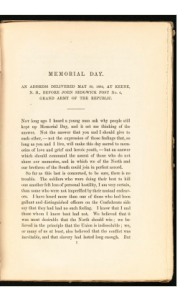Oliver Wendell Holmes Jr, a Civil War veteran and a future Supreme Court Justice, delivered a Memorial Day Speech on May 30, 1884, at Keene, New Hampshire, as a tribute to fallen soldiers from the War Between the States. Educators can take an opportunity to use this speech, a primary source document, with their students to study both the historical events that Holmes references as well as his rhetorical style.
In the first part of the speech, Holmes lays out his belief that twenty years after the Civil War, reunification of the States was possible because of the respect each side had for the other’s convictions:
We believed that it was most desirable that the North should win; we believed in the principle that the Union is indissoluable; we, or many of us at least, also believed that the conflict was inevitable, and that slavery had lasted long enough. But we equally believed that those who stood against us held just as sacred conviction that were the opposite of ours, and we respected them as every men with a heart must respect those who give all for their belief.
Knowing that many in the audience where from the John Sedgwick Post No. 4, Grand Army of the Republic and they had also served in the war, Holmes connected his battlefield memories to theirs, “But you all have known such; you, too, remember!”
Holmes poetically recalled his fallen comrades who were killed on the battlefield: a 19-year-old 2nd lieutenant, a fair-haired lad, a surgeon, a captain:
I see them now, more than I can number, as once I saw them on this earth. They are the same bright figures, or their counterparts, that come also before your eyes; and when I speak of those who were my brothers, the same words describe yours.
Holmes then paid tribute to those women who suffered the loss of their husbands, fathers, and brothers; those “…whose sex forbade them to offer their lives, but who gave instead their happiness.” His rhetorical question about the women left behind because of the consequences of war is timeless:
Which of us has not been lifted above himself by the sight of one of those lovely, lonely women, around whom the wand of sorrow has traced its excluding circle–set apart, even when surrounded by loving friends who would fain bring back joy to their lives?
In concluding the speech, Holmes recalls the passion of those young men who entered the Civil War when their “hearts were touched with fire” only to learn that life is “a profound and passionate thing.”
For Social Studies teachers, the speech references different locations where battles took place: Petersburg, Antietam, Port Hudson, and the White Oak Swamp. Holmes also mentions the men killed at those battles: Col. Paul Revere, Jr.; Lt. James. J. Lowell; William L. Putnam; and the suicidal charge of the 20th Massachusetts Regiment. Each location, each name provides students an opportunity for research.
For English Language Arts teachers, the speech is filled with rhetorical devices that students can identify, and then evaluate each devices’s effectiveness in supporting Holmes’s message:
- Comrades, some of the associations of this day are not only triumphant, but joyful. (direct address)
- Such hearts–ah me, how many!–were stilled twenty years ago. (caesura-any interruption or break.)
- Not all of those with whom we once stood shoulder to shoulder–not all of those whom we once loved and revered–are gone.(Anaphora – repeats a word or phrase in successive phrases)
- Who does not remember the leader of the assault of the mine at Petersburg? (rhetorical question)
In the final lines of the speech, Holmes leans heavily on a literary conceit (elaborate metaphor) of life as music:
Our dead brothers still live for us, and bid us think of life, not death–of life to which in their youth they lent the passion and joy of the spring. As I listen , the great chorus of life and joy begins again, and amid the awful orchestra of seen and unseen powers and destinies of good and evil our trumpets sound once more a note of daring, hope, and will.
Of the 3600 words in Holmes’s speech, the most frequently used words are man, life, and day. By repeating these words, his tribute on Memorial Day in 1884 calls attention to the sacrifices of fallen soldiers in his century, and in ours.






